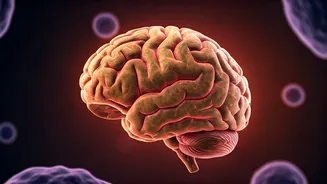The Laughter Response
Shared laughter is much more than just a sound; it's a complex cascade of biological events triggered by social interaction and amusement. When we laugh with
others, our bodies and brains react in remarkable ways. It commences with the brain's detection of humor, activating various regions including the frontal lobe, which is responsible for cognitive functions, and the limbic system, that processes emotions. These regions trigger a chain of reactions. The hypothalamus gets involved to coordinate the release of endorphins, our natural pain relievers and mood boosters. Simultaneously, the cardiovascular system is affected, with heart rate and blood pressure fluctuating. This intricate interplay between the neurological and physiological systems forms the basis of the 'feel-good' effects associated with laughter, and these physiological changes are heightened when laughter is shared.
Brain Chemistry Boost
Laughter dramatically affects brain chemistry. When you laugh, your brain releases a cocktail of neurochemicals that significantly influence your mood and well-being. Endorphins, natural opiates, are released, leading to feelings of pleasure and reduced pain perception. Dopamine, a neurotransmitter associated with reward and motivation, is also triggered, creating a positive feedback loop that encourages more laughter. Furthermore, laughter reduces the levels of cortisol, the primary stress hormone, which reduces anxiety and promotes relaxation. This neurochemical symphony contributes to the overall feeling of well-being and explains why laughter can act as a natural mood elevator. These chemical shifts are particularly potent when laughter is shared, amplifying the positive effects.
Social Connection Catalyst
Shared laughter plays a pivotal role in strengthening social bonds. When people laugh together, it creates a sense of unity and connection. The act of synchronized laughter signals that individuals are in tune with each other, fostering trust and cooperation. It reduces social barriers and facilitates better communication. Laughter acts as a non-verbal cue that signals a shared understanding and mutual enjoyment. This strengthens interpersonal relationships and fosters a sense of belonging. The more laughter shared within a group, the stronger the social bonds and the greater the chances for collaborative endeavors. This shared experience creates a positive feedback loop that encourages further social interaction and solidifies the group's dynamics.
Pain and Stress Relief
Laughter is a potent natural remedy for both pain and stress. The release of endorphins during laughter acts as a natural painkiller, reducing the perception of pain and providing a sense of comfort. This is particularly useful in managing chronic pain conditions and improving overall quality of life. Simultaneously, laughter counteracts the effects of stress. It lowers the levels of cortisol, reducing feelings of anxiety and promoting relaxation. This helps the body recover more quickly from stressful situations and improves the resilience of the immune system. Laughter, therefore, becomes a valuable tool in the face of both physical pain and emotional stress, providing a holistic approach to well-being.
Immune System Boost
The benefits of laughter extend to the immune system. When you laugh, the body enhances the production and activity of immune cells, like T-cells and natural killer cells, which are crucial in fighting off infections and diseases. Laughter can also increase the levels of antibodies, such as immunoglobulin A (IgA), that help protect against upper respiratory infections. Regular exposure to laughter can boost the body's defenses, making it more robust and better prepared to combat various pathogens. Therefore, incorporating laughter into daily life is a practical way to support and enhance the immune system, thereby promoting overall health and wellness.














